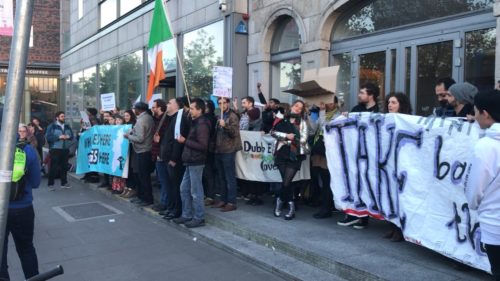The crowd of sixty that gathered in front of the Dublin immigration office chanted according to the commands of an indefatigable migrant activist named Lucky, whose pursuit of justice is matched in optimistic intensity only by his thunderous voice.
“Migrant rights!”
“Are human rights!”
“Migrant rights!”
“Are human rights!”

The protestors were fighting a problem affecting all who immigrate to Dublin, Mitchell Scholars included: the clogged (and soon to be replaced) technological infrastructure created to allocate scarce appointments for residency permit applications. Not only does the need for slots far exceed the supply made available, but the fee-free system has been preyed upon by hackers who code bots to snatch available spaces, which are then sold online to desperate migrants for profit.
Having secured legal residency in this very building earlier that day, I realized, perhaps for the first time, that I live in Ireland as an immigrant. Since then, I’ve found myself reflecting more deeply and personally on the central question that animates my research: What does it mean to be a migrant?
The answer is unsurprisingly variegated. There exists tremendous distance between me and many of the people who are similarly assigned the conditional, revocable label of “migrant” in Ireland, and that space is created by the privileges I embody and enjoy. My whiteness, U.S. citizenship, class and educational backgrounds, and countless other identities uniquely insulate me from challenges that are experienced by certain migrants here. This applies, mutatis mutandis, to the United States as well. The very real thoughts of friends and classmates in both places I call home—of being targeted by police, of requiring explicit state approval to enter or leave or return to the country, of encountering violent racism—quite literally never enter into my consciousness as serious threats to my safety or freedom.
The ease with which I am moved through various geographical, social, and cultural borders forces me to consider how much lies beyond the purview of my perspective. Imposing realities of oppression and exclusion exist outside the orbit of a world that continually makes space for me, wherever I go. This blindness makes me question how capably I can fulfill the purpose of the Mitchell Scholarship: to promote an enduring bond between the United States and Ireland based on shared cultural values. To what extent can I presume to know either place?
I have loved my time as an immigrant to this nation I know to be beautiful, happy, and friendly, even as I recognize that my perspective orients me towards a particular and incomplete image of it. In the face of a changing America and a changing Ireland, however, I can’t help but wonder if the perspective I inhabit, or the perspectives inhabited by my disproportionately white, male, educated cohort of Mitchell Scholars, captures the shifting dynamics that will define each nation in the future.
I chatted with Lucky after the protest. He affirmed our common immigrant identity upon learning that I was from America. He is right in the sense that we both come from different “theres” and find ourselves “here.”
But what does it mean for me to be here?
